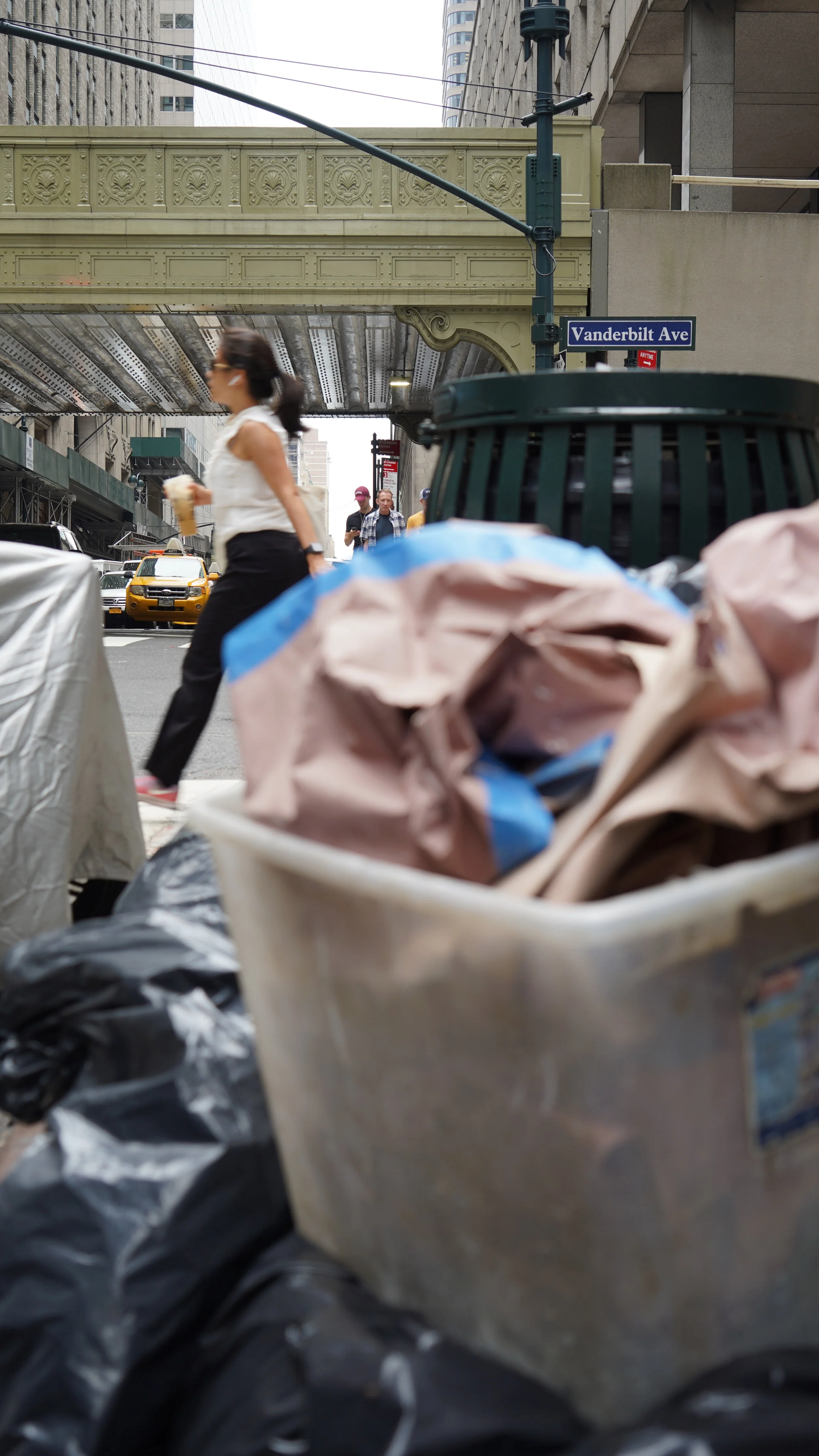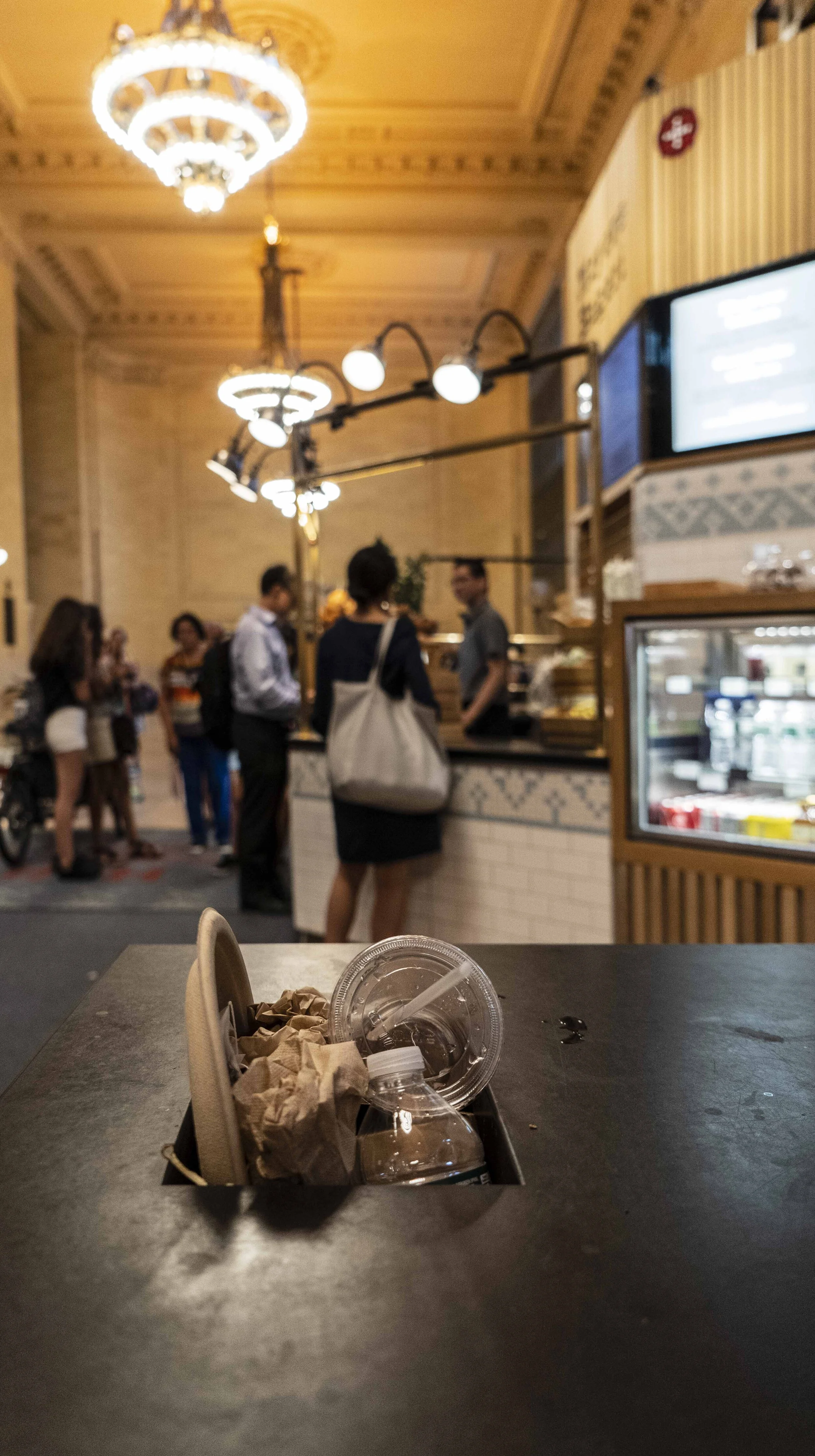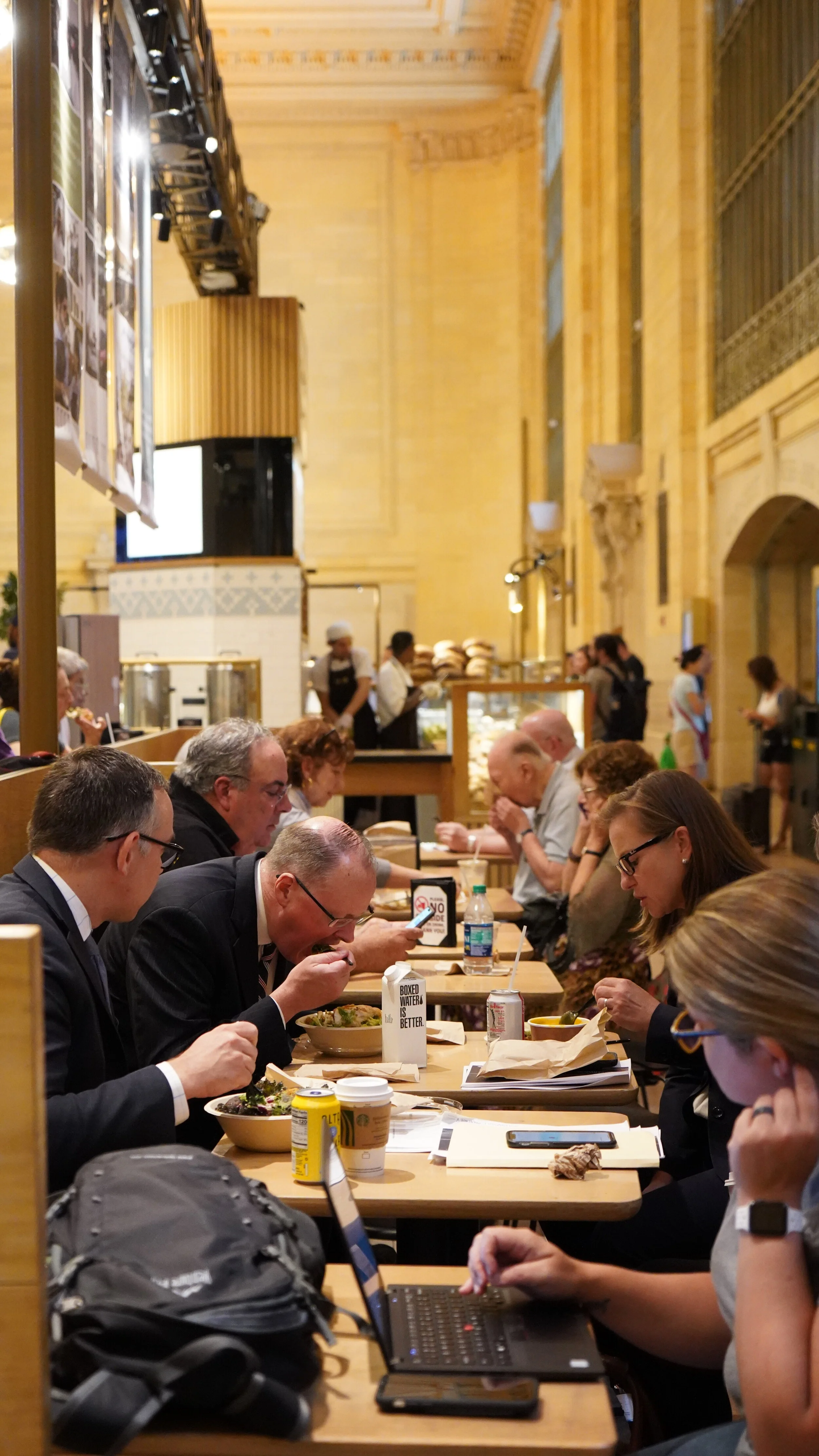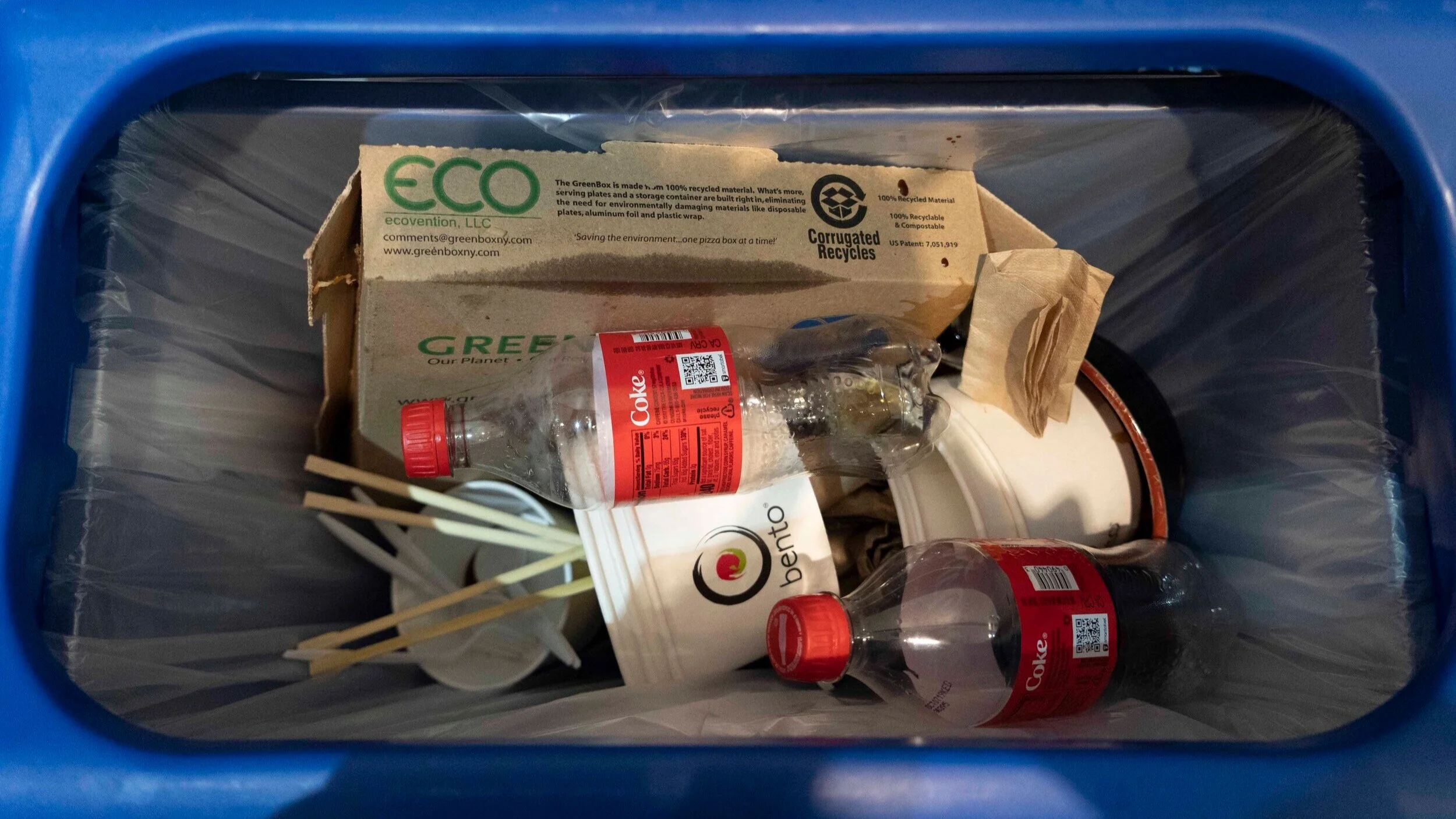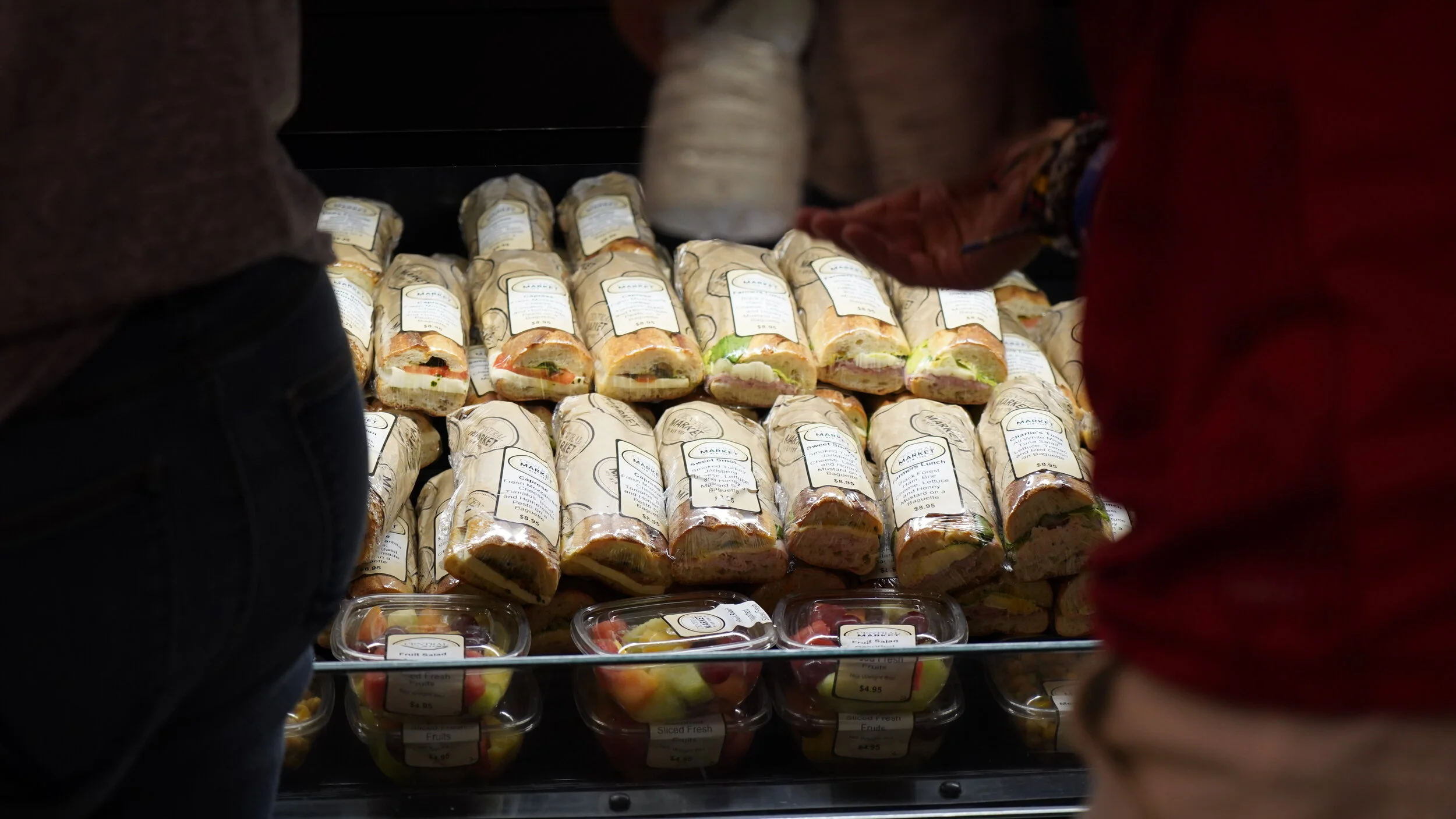Photographer, Researcher; Urban Design Fellowship @ Openbox; 2019
LUNCH TO TRASH
An investigation into trash habits of take out lunch buyers.
In collaboration with the human centered design firm Openbox as part of their bid to help fix the NYC trash problem.
Process
Over the course of 2 weeks, I investigated the waste produced by customers within Grand Central Partnership originating from takeout lunch spots.After an initial site survey I visited 3 takeout restaurants, one large buffet style deli, one small restaurant focused on a single food type, and the Grand Central Food Hall.I arrived at each restaurant at 12:00pm and stayed until 1:30pm. During that time I took notes on the kind of trash created, and where it ended up, what kind of trash receptacles were provided, the clarity of these receptacles, and points along the way where customers could make the decision to produce less trash.
After mapping out the information, I found 4 distinct techniques people used to disposed of their lunch. I broke these techniques into possible personality types in an attempt to understand the user and identify intervention points where changes could be made on the consumer side.The Four Recycling Personalities Identified
The Waste Creator
Customer has not been educated or motivated to care about recycling and simply empties entire contents of lunch trash into refuse.
Observations
This was the most common observed
Sometimes recycled cans and bottles if obvious can and bottle receptacle was near
Some people paused for a second as if considering recycling, but gave up
Lack of instant visual bin clarity and proximity of necessary bins appeared to play a role
Risk Factors
They will continue their current behavior
Observations of their behavior will inspire others to follow suite
The Exhausted Recycler
Customer wants to recycle but finds it too confusing or has been educated to see it as futile and “lazily” recycles without checking bins and contaminates load.
Observations
These people would pause and look at the color, shape, and sometimes headline of bins but not stop to read signs
This was the second largest group I observed, but I suspect people volley between 1 and 2 depending on day and environment
Risk Factors
They will become completely disillusioned and stop caring
They will stop recycling all together
Lack of obvious disposal methods will deter these people from trying
The Efficient Recycler
Customer cares enough to take the time to read bin labels and recycles in whatever way is made conveniently available.
Observations
I saw a few people who paused to read large headlines, but often only when they were looking for a specific bin, such as bottles and cans.
Only one man stopped to read the detailed signs in the deli
Risk Factors
They will stop trying because site makes it too complicated and does not provide accurate signage or create ample opportunities for sustainability.
The Passionate Recycler
This person cares enough to hold on to trash until most sustainable method of disposal is made available.
Observations
Since I didn’t follow anyone home I did not see this kind of recycler, but I added them in as the ideal consumer under the current conditions.
Risk Factors
They will get tired of being the only one that cares and give up
How do we get 1-3 to recycle like 4?
Clearly labeled, eye catching recycling signs that get the person to read before they realize it
More opportunities on site to recycle effectively
Make the nuances of recycling clearer and more concrete
Create a greater sense of urgency around the need to recycle
Create a greater sense of social pressure around the idea of recycling
Re-educate the public about the back end of recycling
Activate The Passionate Recycler as an educator by encouraging communication with their social group and make requests for their employers and frequented lunch spots to provide better recycling options on site.
Nudge Points: Evolving The Waste Creator into The Passionate Recycler
The Waste Creator > The Exhausted RecyclerEducating the public further regarding the need to recycle
The Exhausted Recycler > The Efficient RecyclerEducation regarding the back end of recycling to bolster belief that their efforts make a difference
Education regarding what gets recycled where and when, so they don’t need to read anything to know accurate disposal method
Larger, clearer signs which can can be read without effort
The Efficient Recycler > The Passionate RecyclerBetter opportunities to recycle on site so people who don’t have the time or energy to compost at home or bring scraps to a drop off site still get the opportunity to dispose of everything sustainably.
Research
Everyday Gourmet Deli
Large deli with buffet, as well as an assortment of other hot food, such as pizza, soup, sandwiches, salad. With a large sitting area on the second floor.
Observations
Trash:None of the recycling containers accept soft plastic.
No compost
The majority of dine-in customers would simply throw everything into the plastic bag and chuck that in the garbage.
The Largest exception to this was cans and bottles
Some people threw everything into the recycling that looked like trash.
The only clear disposal method was bottles and cans.
Only one person observed actually attempted to read the recycling labels and dispose of everything properly.
Care was not taken for clarity, there were recycling containers turned into garbage, and garbage containers, turned into recycling.
Signs posted on waste receptacles were not relevant to actual trash.
Reusable Options:The only re-usable items were trays.
Condiments were individually packaged
No opportunity to use personal drink containers
None of the takeout containers had a disposal site other than refuse. (except foil wrapping)
At Register:Automatically gave me plastic bag
Automatically gave me all utensils.
Customer Decision Points
Trash Cans: 31 had a sign with information on it: Plastic film and wrap, plastic bags, foam products, soiled or coated paper, food scraps, furniture.
1 had the wrong bag in it
1 had a hole in it like recycling bin
Recycling Bins: 61 was just a box with a blue bag
1 was just for glass
2 were coca cola shaped bottles with round holes
1 was shaped exactly like the trash can but with a sign and the wrong bag (bulk metal, metal cans, aluminum and foil, glass bottles and jars, plastic bottles and jugs)
ObservationsWhen picking up food you can request a tray. This is made obvious at the pizza counter, but is unclear in other areas.
When disposing of waste you have the option of recycling it or throwing it in the trash. Although this option is only given for a small fraction of the trash an average customer is likely to have.
Bento Sushi
Large deli with buffet, as well as an assortment of other hot food, such as pizza, soup, sandwiches, salad. With a large sitting area on the second floor.
Observations
Trash:No Compost
The only clear disposal method was bottles and cans.
Care was not taken for clarity, beyond bottles and cans.
At Register:At register, automatically gave me a bag.
Reusable Options:
The only re-usable items were trays.
Condiments were individually Packaged
No opportunity to use personal drink containers
None of the takeout containers had a clear disposal site other than refuse.
Customer Decision Points
ObservationsAt register, when ordering hot food, customer is given the opportunity to forgo a bag for a tray
Condiments and utensils are laid out for the customer to choose from
Customer is given a variety of receptacles to dispose of trash and recycling
Trash Cans: 2Recycling Bins: 31 was blue with the recycling logo on it
No indication as to what kind of recycling.
Filled with a variety of trash and recycling.
2 had the traditional circle opening
Listed cans and bottles on it
Filled with a variety of trash and recycling.
Grand Central Food Hall
Large concourse filled with a variety of restaurants and food types with shared seating areas serving all of Grand Central.
Observations
Trash:The types of trash ran the gamut, yet the only recyclable items were cans and bottles.
There were only 5 recycling bins
There were men walking around emptying the trash into dumpsters constantly, no one seemed to notice
Only a tiny portion of the trash is recyclable inside the facility
At Register:No one asked if it was to stay or go. Some places asked if wanted a bag very few, and otherwise everything was packed to go by default.
Reusable Options:Varied Depending on Vendor
Customer Decision Points
Sandwiches appear to consistently use the least amount of plastic
Trash Cans: 31 had a information on it (the sign read: plastic film and wrap, plastic bags, foam products, soiled or coated paper, food scraps, furniture)
1 had the wrong bag in it
1 had a hole in it like a recycling bin
Recycling Bins: 61 was just a box with a blue bag
1 was just for glass
2 were Coca-Cola shaped bottles with round holes
1 was shaped exactly like the trash can but with a sign and the wrong bag (the sign read: bulk metal, metal cans, aluminum and foil, glass bottles and jars, plastic bottles and jugs)

